Continuing our look at the work of BMC volunteers supporting our specialist committees. Access and conservation is considered by many members to be the most important area of BMC work, and the Access Management Group (AMG) sets the overall direction for the organisation’s access, conservation and environment work.
AMG does this by managing the work of a number of sub-groups undertaking specific and standing tasks. AMG also monitors the work of the BMC access officers, offering advice, support and guidance on issues of national and/or significant importance, and provides a steer on Government and legislative proposals. AMG isn’t involved with the day-to-day access and conservation work or access negotiations, which are handled by the three BMC access & conservation officers supported by a network of more than 30 volunteer regional access reps.
Policy & Political
Lobbying, campaigning and responding to consultations is a key element of the BMC’s access and conservation work.
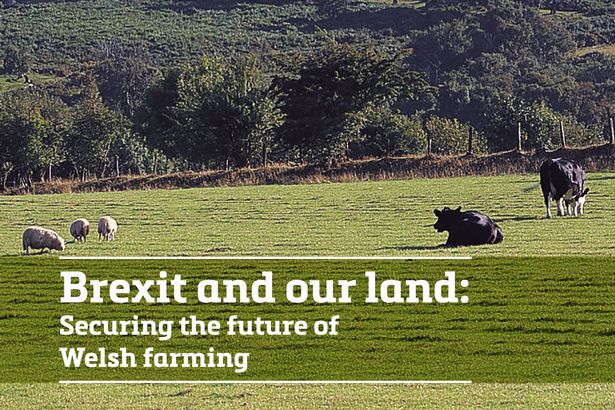
Brexit has dominated the mainstream media, and outdoor recreation is not immune to the potential effects. We responded to the Welsh Government’s consultation on Brexit and our land and also contributed to the Wales Environment Link’s and Wildlife and Countryside Link’s responses ensuring access and landscape protection was included as a public benefit and as public goods rather than simply looking at habitat and species conservation in isolation. We arranged a meeting of the All Party Parliamentary Group on Mountaineering to discuss the potential impact of Brexit on outdoor recreation (the BMC provides the secretariat to this group). We also submitted a response to the DEFRA consultation paper on Health and Harmony: the future for food, farming and the environment in a Green Brexit, as well as DEFRA’s review of National Parks and Areas of Outstanding Natural Beauty in England.
Several years of lobbying and campaigning by the BMC and others yielded a significant improvement to access in Wales earlier this year when the Welsh Government proposed to extend open access to coastal areas.
Following issues negotiating climbing restrictions for nesting birds at Ravensdale in the Peak District, we developed a formal climbing restrictions policy; this is available on the BMC website.
We supported and helped develop AdventureSmart UK – the rollout of a simple safety message/portal for information for visitors to the mountains and coasts to reduce and help avoid the number of unnecessary call outs of emergency services. This included financial support (through the BMC’s Access & Conservation Trust) for a live weather and conditions link direct from the summit of Yr Wyddfa (Snowdon) for hill walkers.
Events
An annual conference is the main event of the year; in September 2018 the hill walking symposium considered the themes of freedom, adventure, environment and community, and was attended by 50 delegates. This year’s conference will be held in Manchester on the theme of Changing Visitor Behaviour and caring for the places we love (from wild camping, and wild fires to pooing in the great outdoors).
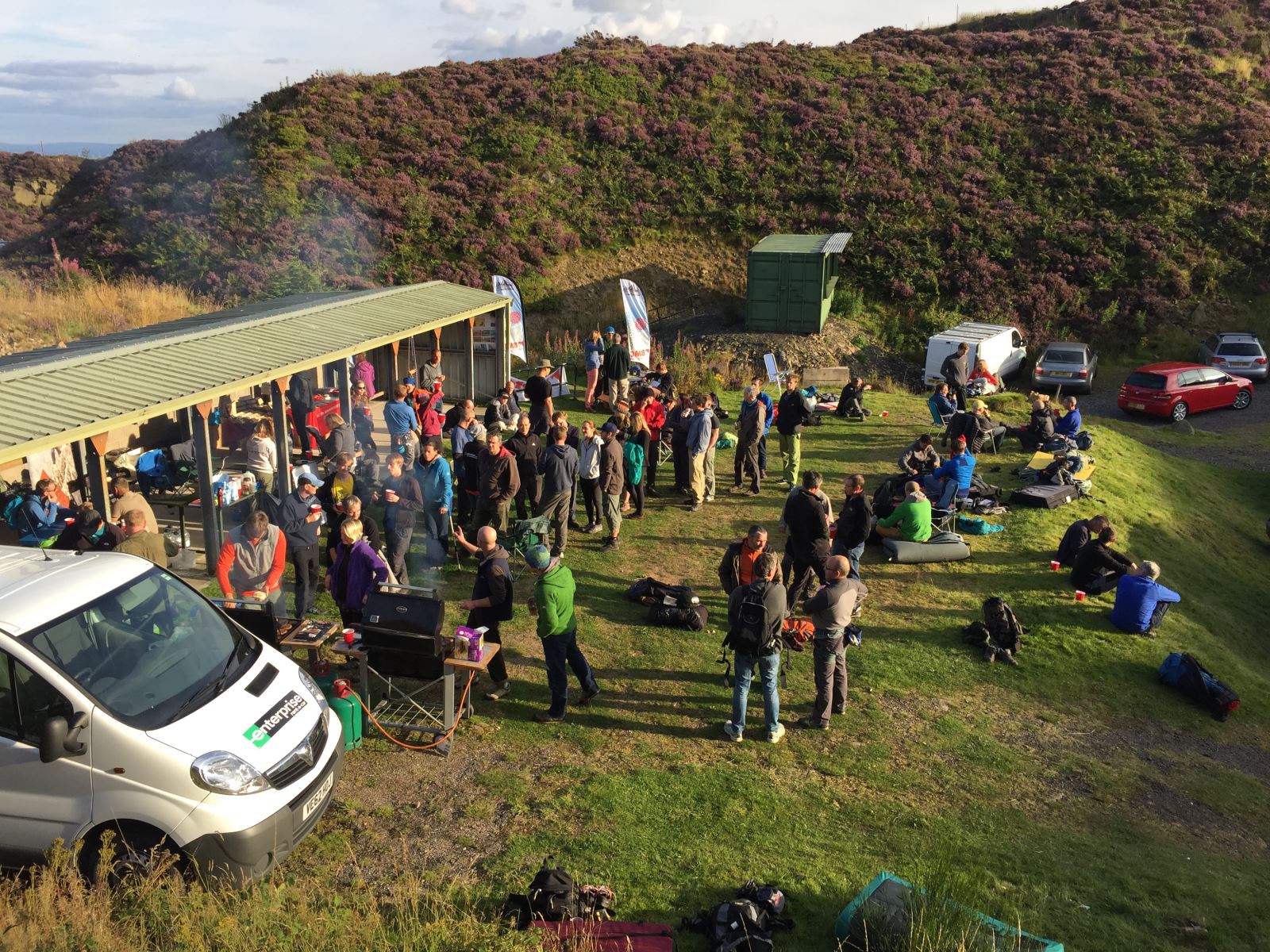
Advanced Burger Base Camp, WiltonFest.
Area climbing and walking festivals have become popular in recent years, with annual events such as WiltonFest and TremFest, and events in the North East, Peak District, Pembroke and Gower. Support for these events ensures that access and conservation form part of the event programme, and that festivalgoers are aware of, and follow best practice behaviour.
Campaigns & media
Our flagship campaign of the past year, Mend Our Mountains: Make One Million, aimed to raise £1 million to repair paths across the UK's 15 National Parks and is now coming to an end. So far it has raised over £700,000.
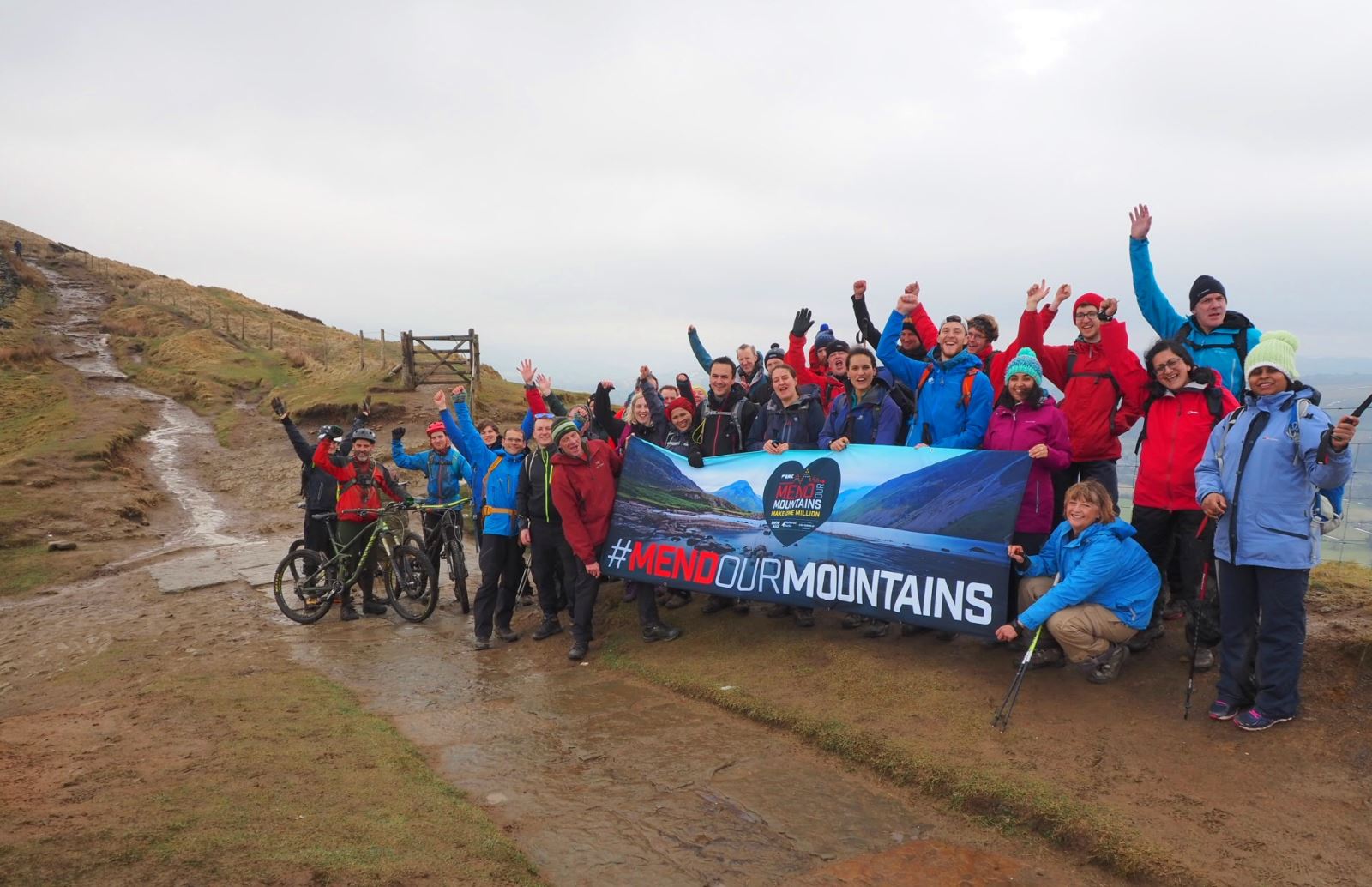
Mend Our Mountains supporters on the Great Ridge, Peak District.
Earlier this year we launched the Hills 2 Oceans (H20) campaign, to encourage the nation to remove as much litter and plastic from our hills, mountains and crags as possible so it doesn’t end up in our oceans.
Media work includes responding to requests for interviews on regional and national topics; recent examples include BBC coverage on the impact of huge visitor numbers to the mountain areas of Wales over the Easter and other bank holiday weekends. A major source of contention seems to be the continued growth in challenge and organised events and the impact they are having as well as the pressures on car parking, erosion and congestion.
Access and conservation articles targeting behavioural problems occurring in climbing and walking areas are published regularly on the BMC website; recent articles have covered topics such as wild fires, wild camping and raptor persecution.
Site work
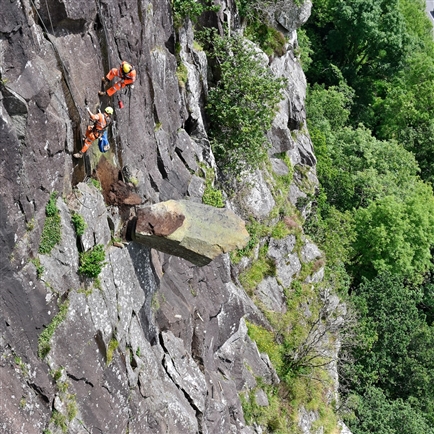
Removing a dangerous loose block at Tremadog.
The access team has responded to many site-specific issues from negotiating new access to investigating (and publicising) rockfalls as well as encouraging good practice at the crags and agreeing climbing restrictions for nesting birds. For example:
-
In association with Mountain Training Association and the Site Ranger, we ran an evening workshop for instructors and outdoor centres on best practice at Castle Inn Quarry near Colwyn Bay following concerns about the impact of group use. A further day’s practical work by local outdoor centres in clearing loose rock from habitats below the crag and clearing invasive vegetation will be arranged in the winter.
-
We worked with access reps in the North East to negotiate access to five crags owned by the Dawney Estate on the North York Moors.
-
We held meetings with the RSPB regarding access and restrictions at Gogarth and the removal of a large block at Tremadog.
-
Following a site visit with the new Lundy Warden, some significant access gains have been made with two additional crags identified as being possible to lift restrictions on providing specific access routes are used to avoid disturbance. We now have a good working relationship with the Warden and he now fully understands the importance of involving the BMC in any future access issues on the island to ensure information is disseminated as widely as possible.
-
A new Method Statement and Risk Assessment was recently agreed and published for volunteers working at height (on ropes) on Southern Sandstone. If anyone wants to get involved with volunteering, please contact the Sandstone Volunteers Group.
-
We have liaised with Natural England on coastal access, advising on route selection and area access for climbers and walkers.
-
The BMC Regional Access Database (RAD) is constantly updated, particularly during the nesting season. This also involves climbing access restrictions meetings across England and Wales and supporting local access reps in negotiations during the bird nesting season.
-
We supported and attended four safety briefings for climbers wanting to climb on the live military firing range at Range West in Castlemartin, Pembrokeshire; over 350 people attended the briefings in 2019.
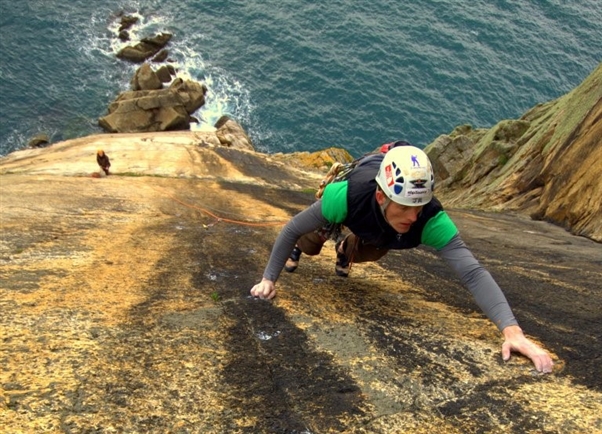
Improved access and better working relations on the unique island of Lundy.
Working in partnership
The BMC access team attend many meetings throughout the year with various outdoor and conservation, climbing organisations. These include meetings with Defence Estates, National Trust, Natural England, Campaign for National Parks, Climate Coalition, Wales Environment Link, National Access Forum for Wales, Sport and Recreation Alliance, Sports Wales, Welsh Sports Association, CLA and other outdoor and recreation as well as Mountaineering bodies.
BMC is a member of the Mountain Liaison Group in the lake District which brings together representatives from recreation, land owning and conservation backgrounds to address issues as they occur as well as review and amend annual seasonal restrictions. The BM<C also sits on the Yorkshire Cave and Crag Access group which similarly meet to discuss climbing and caving specific access issues within the National Park
The access team would like to thank the huge network of climbing and hill walking volunteers who support all of the access work and who are our ‘ears on the ground’. From those of you who are involved at a local area level to the specialists who sit on our specialist access group, thank you!
.jpg)
« Back